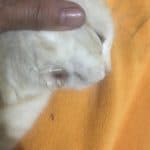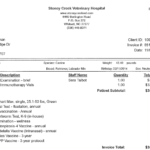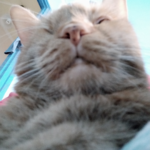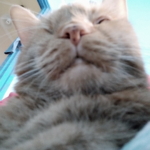Good morning-
It all depends on the circumstances. Your vet will be able to tell after they examine your cat and then you can go from there. Best of luck – hope everything is ok.
My cat has abscess on the face how i can cure at home? Is it possible her to give anti biotic for human?
Comments
about how much is it to treat an abscess on a cat?
Comments
Hi there,
I guess it will be long.
Anamnesis
My cat is an adopted cat from shelter. He was 1.5 yrs old when I adopted him and 9 months old when he got into the shelter. He is 7.5 yrs old now.
He suffered from catflu. He lost his left eye because of it. He had polyp in his left nasal cavity having spread to his left earcanal also, so he had to undergo a surgery at the age of 1.5.
The problem
Every season changes– fall, spring — makes him sneeze so I always administer him Vetri-DMG and Flumax to strenght his immune system.
This fall he was sneezing a lot sounded some discharge up, but didn’t see anything then he started snoring didn’t matter if he was sleeping or awaken. He vomited brownish, greenish, and yellowish fluid. Later on he tried to vomit, but nothing came up. On the top of these he seemed to be gasping for breath or being out of breath.
Since having administered Vetri-DMG and Flumax for 3 or 4 weeks I took him to a vet. He administered him eyedrops (3×2 for 7-10 days) Tobradex — corticosteroid and antibiotics — as he found nothing, but his teary eye and conjunctivitis, which is of course tearing all the time as he has epiphora thanks to catflu. He also administered Moxiclear spot on when the next deworming time comes (he is given dewormer each month, Fenbendazole and Praziquantel — guess you know it as Panacur) to make sure that he has no heartworm or lungworm…
Eardrops have been used for 8 days and he has started snoring again. He snores sometimes even he is awaken when breathing in or out.
QUESTION
His RIGHT side nostril seems to be swollen inside, so as far as I can see ti and narrower on this side. And that’s what makes me be so worried. I am afraid of… nasal cancer. He is a ginger cat and has lentigo on his nose, in on his lips, on his pows… How can I find out what the problem is? Unfortunately, in my country vets doesn’t know anything except giving injections… If an illness is not well-seen yet they do nothing.
Help us please!
Thank you so much in advance!
Comments
We got a 3-4 month old puppy in August, and he has showed positive for hookworms twice, then again for DNA of hookworms. We’re taking another sample this week to see if it’s still showing. The poor thing has been through two rounds of dewormer which made his bowel movements super frequent (in crate while we were at work , etc.). With the DNA, the vet had us give him his second month of heartgaurd, which he was due for. The foster family and his sibling who was with them reportedly do not have worms.
Are hookworms normally this difficult to get rid of? Should I talk to another vet?
Comments
Kitten with completely atonic colon, possible causes? (Long text ahead)
So Nov. 3th in the evening we got 2 kittens, estimated 6 weeks old, thin. However due to being cold outside they already had very thick fur, so it wasn’t visible how thin they were. Weight was 550 & 650gr.
The finder said they have been more active before and only now they were able to get those two. They borrowed to live traps to get the mother and another kitten.
Both were seen eating. They were treated against worms (Milbemycinoxim/Praziquantel) and fleas (Lotilaner)
Nov 4th: Overnight everything was eaten, poo was solid. Kittens were responsive and alert. To the evening only half was eaten. Poo was still solid.
Nov 5th: Nothing was eaten over night, the little one seemed a bit weaker. I started to feed them with a syringe. They started with diarrhea, but that sometimes happens when feeding with a syringe.
Nov. 6th: They still don’t eat by themselves. The smaller one still seemed weaker, but otherwise it seemed fine. A bit diarrhea. In the evening I found it the litter box, not being able to stand, barely reacting. It hat vomited (at least it looked like it), and still had poo stuck on it. It was immediately brought to a vet. It received glucose solution s.c., something against vomiting, pain and an antibiotics. Lung sounded free, heart (ultrasound) was fine, too. A test of parvovirosis came back negative. I took both of them home that night, so I could feed it smaller portions more often and to give more fluids. 2 hours later to was able to stand again. I fed them every 3-4 hours, fluids every 6 (only small amounts obviously). It was lying on a warmth mat. The bigger one was fine, but avoided it’s litter mate.
Nov. 7th: No further improvement. None of them was eating on their own. The smaller one was still lying down most of the time, sleeping, but would react when I came to feed them. It would stand up and walk to the litterbox between the feedings, but the poo had a weird consistency. Not really diarrhea, but veeeery sticky, so it always carried it back to it’s sleeping place. So I had to clean it before every feeding. A test on giardia was positive, treatment started with Carnidazol. Continue to feed them with a Syringe and fluids for the smaller one. Fluids were always absorbed to the next feeding, but it still was a bit dehydrated (skin fold test). The bigger one would play in between and seemed fine otherwise.
Nov. 8th: No changes in the smaller one during the day, still weaker, able to walk, sit and stand, but sleeping most of the time. Today there was rarely poo in the toilet. I assumed that the treatment started working and it was a good sign (although I already had the feeling that something was wrong… wish I would have trusted that feeling). In the evening it seemed weaker, but would still accept being fed with a syringe. It felt different, less body tension, but would still walk away/go to the t. 10pm feeding. More calm, didn’t want to eat that much, peed on me. Meowed louder during giving the fluids than usual and tried to get away. 2am clock, the fluids weren’t absorbed completely, it’s abdomen felt like a sponge. I only fed a tiny amount. 6am weaker, would lie down immediately, breathing was shallow and faster, meowing, I didn’t feed it, fluids still not absorbed. Rushed to the vet.
-> Heart had a low frequency, breathing fast and shallow
-> X-Ray lungs were free, only a tiny amount of fluids in the abdomen, however the complete colon and stomach were filled with food. There was no visible blockage or air.
-> Ultrasound: Absolutely no movement in the colon/stomach, no blockage or air seen either. Kidneys and liver seemed fine
-> Punctation of the abdomen: ca. 3-4ml of fluids, lots of proteins, a bit of blood. Didn’t look like FIP. Possible that the fluids came out of the colon.
It was given something against vomiting, pain, antibiotics, something to help the cardiovascular system and something to get the colon moving again. To help with its breathing got a mask with additional oxygen. However in the next hour it got worse, so we decided to let it go. After it was gone food came back out of it’s mouth. And it didn’t even smell like it had started to digest.
It’s littermate is still with me and fine. It started to eat on its own yesterday.
Now I obviously ask myself what i could have done better/different. By now I think I should have started with additional syringe feeding earlier – at least with the smaller one. And I should have reacted when my feeling told me that something was wrong, even when there were no obvious changes yet. I somehow have the feeling that I sis something wrong and killed it. Did I give too much fluids (but lungs were free and only a bit fluid in the abdomen)? Did I feed too much? Other kittens eat even more without problems – and the other one is fine.
And what can be the causes for the complete stop of movement in the colon/stomach?
I know that FIP can cause this and an ileus (but there were no visible blockage, everything was filled with food), are there other causes? Can giardia do this?
Comments
5.5 days after bringing our 16 week puppy home (also 5.5 days after her second parvo shot) she tested positive for parvo and giardia. In another 5 days she had a negative ELISA parvo.
Upon bringing her home and following all instructions we can’t get solid poo, unless we feed boiled chicken, white rice and pumpkin. We’ve tried twice a slow transition to Pro Plan Chicken EN as our vet prescribed but once we move to kibble and pumpkin only (Forta Flora too) we are back to liquid poo. If we keep at least a 1/4 cup boiled chicken and rice we get some ok poo and some not great however not liquid.
Added to this her poo has mucus. Breeder is not happy with the kibble our vet has us on. We’d like to try something with nutritional content but are fearful we will setback progress. That said where we are at isn’t all that great.
We’ve had a diarrhea panel in addition to lots of other bloodwork and a urinalysis every thing so far is negative. Vet says there is one more bloodwork we can try or exploratory surgery to see if she has IBS.
Trying to determine do I try other foods or did the parvo and treatment ruin her GI and this will never be solved? Is the 2 months post parvo not enough time for get GI to repair?
Help I’m frustrated and confused.
Comments
Pit bull mix with suspected ivdd. Losing the mobility in his hind legs. Urinating and defecating on himself and the only option I was give was a 10,000$ surgery. I just need advice on how to care for my poor dog so that he can have a quality life. I got him when he was 8 weeks old and I was only 16 so we have grown up together I love him to pieces. Please help me!
Comments
I have the sweetest Siamese mix, Goldie, adopted from our local humane society. Unfortunately, she has been a sick kitty and she’s had 4 URIs in her two years of life. She did take the full course of antibiotics for all of them and healed successfully.
Recently, she’s been making low snoring noises periodically when awake and sleeping and it seems to be only when inhaling. She’s a talkative girl and sometimes her voice changes when meowing. She has no other symptoms and is eating, drinking and playing normally and there has been no mouth breathing while making the noises. Her breathing rate has been normal. Sometimes it seems like she is making the noises and then stretches out real long in the first picture to get comfortable.
Below is a link to her video around 24 seconds you can hear it, you might have to put it at full volume:
If this is difficult to hear it sounds very similar to this:
I have a vet appointment next week and am concerned she has stertor from an oropharyngeal polyp from my online research and her symptoms. Is this something that a vet would be able to see without putting them under sedation? Are there any other suggestions you have as to what I could have them test for if it’s not a polyp? I wasn’t sure if she could have asthma or another breathing related issue.
Finally, do you by chance have any recommendations for vets in Phoenix, Arizona? I am just getting myself prepared if needed for a second opinion or if surgery is necessary.
Appreciate it and all your tips and videos online! You are doing incredible work!
















At first i observe that her face has swollen and i found out this morning that it like red almost rupture.
Hello.
At my clinic I always prescribe antibiotics and warm water compresses to do at home. I’m sorry but I can’t prescribe anything over the Internet. But yes in some cases we utilize human antivirus but the dosages are much much smaller so they are often given to you by the vet to make sure we aren’t overdosing.